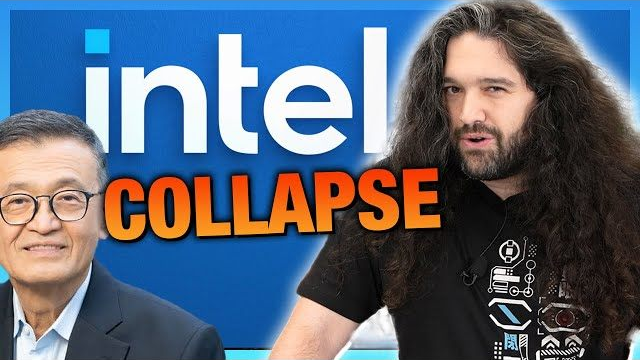Intel collapsing?
-
Starting to see a lot of worried people as Intel descends downwards rapidly. Reminds me of Nokia how this is going...
It of course won't happen, but if Intel went poof next monday then what would happen to the x86 ecosystem. It's basically co-owned by AMD and Intel. As I recall the sharing partnership that these two have basically prevents neither guy from selling their patents/license to third parties. Would we just be left with AMD monopoly with intel's corpse hanging from it, until X86 finally croaks? Do these CPU licensing agreements prevent just wholesale acquisition of Intel?
-
It of course won't happen, but if Intel went poof next monday then what would happen to the x86 ecosystem. It's basically co-owned by AMD and Intel. As I recall the sharing partnership that these two have basically prevents neither guy from selling their patents/license to third parties. Would we just be left with AMD monopoly with intel's corpse hanging from it, until X86 finally croaks? Do these CPU licensing agreements prevent just wholesale acquisition of Intel?
If Intel disappears, I imagine AMD will end up as the sole owner of the relevant Intel x86 patents during bankruptcy proceedings. Then AMD will then either negotiate a new agreement with someone else who wants to make x86 processors, or they end up having a monopoly on x86 and are forced to tread extremely lightly to avoid an antitrust lawsuit.
-
If Intel disappears, I imagine AMD will end up as the sole owner of the relevant Intel x86 patents during bankruptcy proceedings. Then AMD will then either negotiate a new agreement with someone else who wants to make x86 processors, or they end up having a monopoly on x86 and are forced to tread extremely lightly to avoid an antitrust lawsuit.
I think someone would get those Intel X86 rights. However there may be questions on whether the rights from AMD like A64 are transferable. But if some company buys the entire Intel X86 division, I bet that counts as the patents remaining within the division that has the rights, although it is under different ownership. We recently had the Arm vs Qualcomm case that showed this can be allowed.
Anyways this might be disruptive, and the immediate effect would probably be that AMD X86 will be a lot more expensive. -
Part of what saved AMD was spinning off their fabs into a separate company. Besides the cash flow, they could focus on design and weren't hitched to what their own fabs could produce. They could choose the best fab contract they could afford.
Pat Gelsinger floated the idea of spinning off the fabs, but the US government shut it down as part of the deal for building new fabs with government money. The fabs that Intel may not even finish now.
Another factor for AMD was having their SoC in consoles. Kept some cash flow going when they desperately needed it. Intel doesn't have that benefit, either. AMD owns the PS5 and Xbox, while Nvidia has Nintendo. Steam Deck-like handhelds are a small but growing market, and all the ones people want to buy run AMD.
So the question comes up of what Intel can even do for cash flow. Their GPU division might start showing real profit in another generation, but they have to survive that long while taking a loss. One more uncompetitive generation of CPU releases will probably doom their core product, and the best they can hope for there is "not completely suck". The datacenter market was holding on because Intel has traditionally been rock solid stable, but that argument was killed with the 13th/14th gen overheating issues (which did affect equivalent server processors, as well). Their other hardware, like networking chipsets, comes with the same dark cloud looming over it, and it isn't enough to keep the company running, anyway.
AMD was absolutely hitched to global foundries for years, it was only because glofo decided to not go for 7nm, that AMD was allowed by glofo to use TSMC for the Ryzen 3000 series (Zen 2), and was partially released from the agreement ahead of time, provided they still had substantial orders with GloFo, which they honored with continuing discounted sales of the Ryzen 2000 series produced at glofo 12nm, and also using GloFo 12nm for their l3 cache chips.
AMD maneuvered the situation brilliantly, and turned necessity into an advantage. -
Starting to see a lot of worried people as Intel descends downwards rapidly. Reminds me of Nokia how this is going...
We really need Intel to get their shit together.
-
It of course won't happen, but if Intel went poof next monday then what would happen to the x86 ecosystem. It's basically co-owned by AMD and Intel. As I recall the sharing partnership that these two have basically prevents neither guy from selling their patents/license to third parties. Would we just be left with AMD monopoly with intel's corpse hanging from it, until X86 finally croaks? Do these CPU licensing agreements prevent just wholesale acquisition of Intel?
Companies as big as Intel don't typically go poof, they have bankruptcy proceedings and sell off their assets. If those assets contractually can't be sold, then yeah AMD would be the remaining owner.
-
We really need Intel to get their shit together.
Me, standing on the shore with a life raft next to me, watching Intel drown: ehhhh.. do we really, though...? They tried to cancel a contract with amd and sue them in an attempt to kill the company in its infancy; they bribed major OEMs when amd was first to market with a 1GHz chip, first to market with x64, trying again to kill the company, this time through starvation; then they sat on their ass for 15 years with essentially no progress, just collecting cash for the most minimal of improvements... I'm sure I'm forgetting a ton of other shit the company has done, playing dirty at every opportunity. It's been about a decade since I took a deep-dive into this.
I don't have a (monitary) horse in this race, but as this has progressed, with the side addition of their chips literally disintegrating, it's been very... enjoyable, validating, to have stuck with amd since finding out about all the bullshit intel has, would do, and continues to do, to try and control the market and remain in control, no matter the cost. Karma may, finally, have caught up with them.
-
Me, standing on the shore with a life raft next to me, watching Intel drown: ehhhh.. do we really, though...? They tried to cancel a contract with amd and sue them in an attempt to kill the company in its infancy; they bribed major OEMs when amd was first to market with a 1GHz chip, first to market with x64, trying again to kill the company, this time through starvation; then they sat on their ass for 15 years with essentially no progress, just collecting cash for the most minimal of improvements... I'm sure I'm forgetting a ton of other shit the company has done, playing dirty at every opportunity. It's been about a decade since I took a deep-dive into this.
I don't have a (monitary) horse in this race, but as this has progressed, with the side addition of their chips literally disintegrating, it's been very... enjoyable, validating, to have stuck with amd since finding out about all the bullshit intel has, would do, and continues to do, to try and control the market and remain in control, no matter the cost. Karma may, finally, have caught up with them.
We need every competitor in the cpu market. If AMD wins and destroys intel they will act the same way. We need another competitor in the GPU market as well.
-
We need every competitor in the cpu market. If AMD wins and destroys intel they will act the same way. We need another competitor in the GPU market as well.
Competition is fine, but just like the school bully, if I see him getting his ass handed to him, I'm stopping to watch, not to help. But I'm sure as hell going to enjoy the show.
-
What happened to all that money Biden gave them? Down the toilet? I don't know about you, but some motherfuckers got paid.
Not sure if it's the same amount of money you're referring to or if there's another budget given to them but the video does indicate that for one of them, Intel claims that they have never received the money.
-
Starting to see a lot of worried people as Intel descends downwards rapidly. Reminds me of Nokia how this is going...
We need more competition in HW space tho
-
We need more competition in HW space tho
True. Hopefully Intel can work things out, but I don't think this strategy is it.
-
True. Hopefully Intel can work things out, but I don't think this strategy is it.
Losing cash hand over fist and basically screwing everyone over certainly isn't the way to do it...
Having the main product you have been known for for like ever being so poor isn't it either -
Companies as big as Intel don't typically go poof, they have bankruptcy proceedings and sell off their assets. If those assets contractually can't be sold, then yeah AMD would be the remaining owner.
They are losing money hand over fist right now though and have basically broken hundreds of agreements they have already been paid for...
I do agree - I believe what would happen is they would be split up, as per most of these things, and the US govt would ensure that the X86 division remains american. I would imagine the real issue here is not the cpus but the fabs as they are the things really underperforming and have for at least a decade now -
I think someone would get those Intel X86 rights. However there may be questions on whether the rights from AMD like A64 are transferable. But if some company buys the entire Intel X86 division, I bet that counts as the patents remaining within the division that has the rights, although it is under different ownership. We recently had the Arm vs Qualcomm case that showed this can be allowed.
Anyways this might be disruptive, and the immediate effect would probably be that AMD X86 will be a lot more expensive.This is exactly how I see it panning out. The new owners would be american as well as there is no way the US govt would allow it to go overseas
-
Competition is fine, but just like the school bully, if I see him getting his ass handed to him, I'm stopping to watch, not to help. But I'm sure as hell going to enjoy the show.
Publicly traded companies aren't children though, where being nice or bad is a force of habit to them, and they are able to learn and improve from their mistakes.
AMD has been an underdog under Intel and Nvidia for most of their existence. If they become the market leader, they will behave like them and start being anti-competitive.
-
Starting to see a lot of worried people as Intel descends downwards rapidly. Reminds me of Nokia how this is going...
How do you fuck up so badly when you the largest share of the market? Like what?
-
Competition is fine, but just like the school bully, if I see him getting his ass handed to him, I'm stopping to watch, not to help. But I'm sure as hell going to enjoy the show.
Intel can stand to still lose a few pegs.
But after a bunch of beatings even a bully can become the underdog.
-
Intel can stand to still lose a few pegs.
But after a bunch of beatings even a bully can become the underdog.
I think the healthy approach is to let it play out, and stop "meddling" as usual with the "free" market. Everybody's observing free market karma at play. Let it happen, as much as it will. All those intel mbas deserve it completely.
So far AMD has a good history of not being evil.
-
How do you fuck up so badly when you the largest share of the market? Like what?
In this case prioritizing „shareholder value“ above innovation and hitting engineering roadblocks while trying to catch up.







